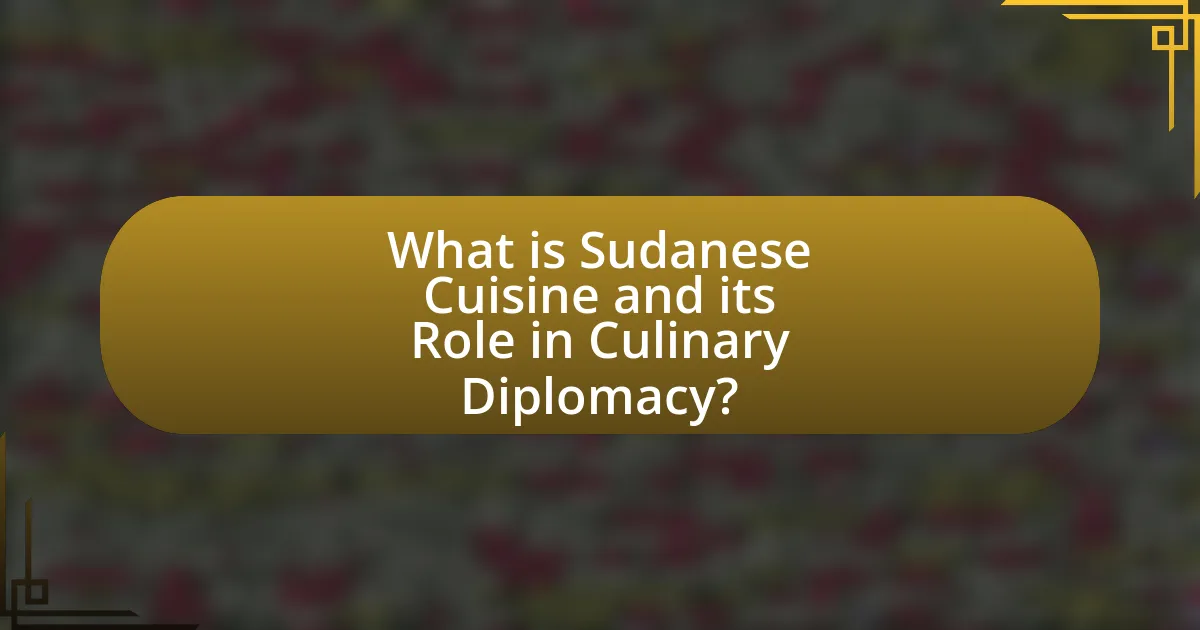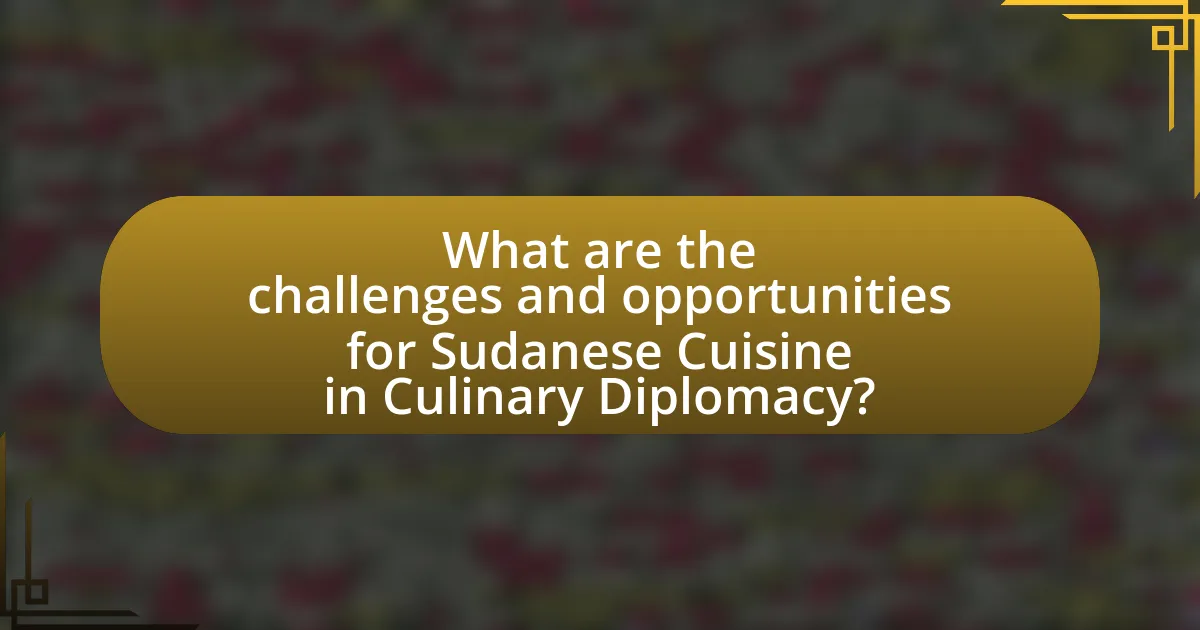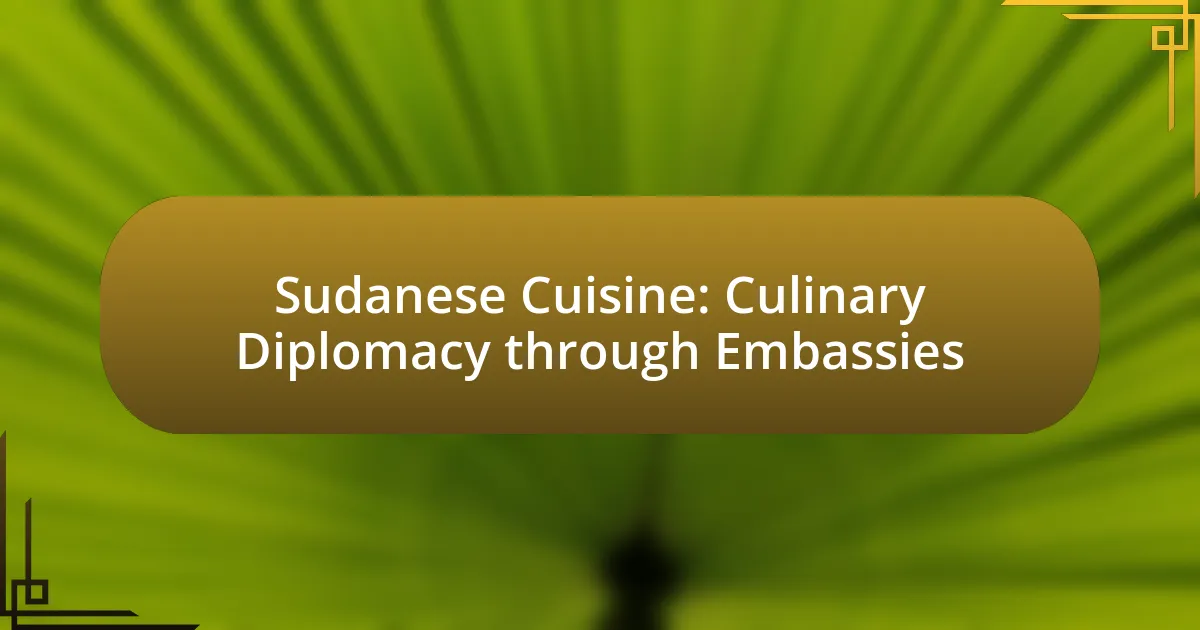Sudanese cuisine is a diverse culinary tradition that reflects the cultural heritage of Sudan, utilizing ingredients such as sorghum, millet, and various meats and vegetables. The article explores the role of Sudanese cuisine in culinary diplomacy, highlighting how traditional dishes like ful medames and kisra are used in diplomatic events to foster cultural exchange and strengthen international relationships. It discusses the significance of key ingredients, traditional cooking methods, and the impact of embassy-hosted events in promoting Sudanese culinary heritage. Additionally, the article addresses the challenges and opportunities faced by Sudanese cuisine in gaining global recognition and the potential of technology and social media to enhance its visibility.

What is Sudanese Cuisine and its Role in Culinary Diplomacy?
Sudanese cuisine is a rich and diverse culinary tradition that reflects the country’s cultural heritage, utilizing ingredients such as sorghum, millet, and various meats and vegetables. Its role in culinary diplomacy is significant, as it serves as a means of cultural exchange and relationship-building between Sudan and other nations, particularly through embassy-hosted events that showcase traditional dishes. For instance, Sudanese dishes like ful medames and kisra are often featured in diplomatic gatherings, promoting understanding and appreciation of Sudanese culture while fostering international ties.
How does Sudanese Cuisine reflect the country’s culture and history?
Sudanese cuisine reflects the country’s culture and history through its diverse ingredients and cooking methods, which are influenced by various ethnic groups and historical trade routes. The use of staple foods like sorghum and millet showcases the agricultural practices that have been central to Sudanese life for centuries. Additionally, dishes such as ful medames and kisra highlight the blend of Arab, African, and Mediterranean influences, illustrating the historical interactions through trade and migration. The communal aspect of meals, often shared among family and friends, emphasizes the importance of social bonds in Sudanese culture. Furthermore, traditional cooking methods, such as the use of clay ovens, connect modern Sudanese practices to ancestral traditions, reinforcing a sense of identity and continuity in the face of historical challenges.
What are the key ingredients and dishes in Sudanese Cuisine?
Key ingredients in Sudanese cuisine include sorghum, millet, wheat, and various legumes, while staple dishes consist of ful medames (stewed fava beans), kisra (sorghum flatbread), and tagine (a slow-cooked stew). Sorghum is a primary grain used to make kisra, which serves as a base for many meals. Ful medames is often enjoyed for breakfast and is rich in protein, while tagine incorporates meats and vegetables, reflecting the diverse agricultural landscape of Sudan. These ingredients and dishes highlight the cultural significance and nutritional value of Sudanese cuisine.
How do traditional cooking methods influence Sudanese dishes?
Traditional cooking methods significantly influence Sudanese dishes by emphasizing the use of local ingredients and techniques that reflect the region’s cultural heritage. For instance, methods such as slow cooking in clay pots and the use of open flames enhance the flavors of staple foods like stews and breads, which are central to Sudanese cuisine. These techniques not only preserve the nutritional value of ingredients but also create unique textures and tastes that are characteristic of Sudanese dishes, such as the popular dish “foul” made from fava beans. The reliance on traditional methods also fosters community engagement and the passing down of culinary knowledge through generations, reinforcing cultural identity.
Why is Culinary Diplomacy important for Sudan?
Culinary diplomacy is important for Sudan as it serves as a means to enhance cultural exchange and foster international relationships through the promotion of Sudanese cuisine. By showcasing traditional dishes at embassies and cultural events, Sudan can highlight its rich culinary heritage, which includes unique ingredients and cooking techniques that reflect its diverse cultural influences. This approach not only helps to improve Sudan’s global image but also encourages dialogue and understanding among nations, as food often acts as a universal language. Furthermore, culinary diplomacy can stimulate tourism and trade by attracting interest in Sudanese food products and culinary practices, ultimately contributing to the country’s economic development.
How does Sudanese Cuisine serve as a bridge between cultures?
Sudanese cuisine serves as a bridge between cultures by incorporating diverse culinary influences from Africa, the Middle East, and beyond, reflecting the country’s historical trade routes and cultural exchanges. The use of ingredients like sorghum, millet, and spices such as cumin and coriander showcases the fusion of local and foreign culinary practices. Additionally, communal dining traditions in Sudan promote social interaction and cultural exchange, as meals are often shared among families and guests, fostering understanding and appreciation of different cultural backgrounds. This culinary diplomacy is evident in events hosted by Sudanese embassies, where traditional dishes are served to promote Sudanese culture and strengthen international relationships.
What role do embassies play in promoting Sudanese Cuisine?
Embassies play a crucial role in promoting Sudanese cuisine by organizing cultural events, culinary festivals, and food tastings that showcase traditional dishes. These diplomatic missions facilitate cultural exchange and foster appreciation for Sudanese culinary heritage among foreign audiences. For instance, embassies often collaborate with local chefs and culinary experts to host Sudanese food events, which not only highlight the diversity of Sudanese ingredients and cooking techniques but also enhance bilateral relations through shared cultural experiences.

How is Sudanese Cuisine showcased through Embassies?
Sudanese cuisine is showcased through embassies by hosting cultural events, culinary festivals, and diplomatic receptions that feature traditional dishes. These events allow embassies to present Sudanese culinary heritage, such as dishes like ful medames and kisra, to a diverse audience, promoting cultural exchange and understanding. For instance, during Sudan’s National Day celebrations, embassies often serve authentic Sudanese meals, highlighting the country’s rich flavors and cooking techniques, which fosters appreciation for Sudanese culture among international guests.
What events do embassies host to promote Sudanese Cuisine?
Embassies host cultural events such as food festivals, cooking demonstrations, and culinary workshops to promote Sudanese cuisine. These events often feature traditional dishes, allowing attendees to experience Sudanese culture through its food. For instance, embassies may organize Sudanese nights where local chefs prepare authentic meals, providing an opportunity for cultural exchange and education about Sudanese culinary traditions.
How do these events enhance cultural exchange?
Culinary events enhance cultural exchange by providing a platform for diverse communities to share and experience each other’s food traditions. These events facilitate direct interaction among participants, allowing for the exchange of recipes, cooking techniques, and cultural stories associated with the dishes. For instance, Sudanese culinary events hosted by embassies often showcase traditional dishes, fostering appreciation and understanding of Sudanese culture among attendees from different backgrounds. This interaction not only promotes cultural awareness but also strengthens diplomatic ties, as food serves as a universal language that transcends barriers.
What types of dishes are typically featured at these embassy events?
Embassy events typically feature a variety of traditional Sudanese dishes, including stews, grilled meats, and flatbreads. Commonly served items include “Ful Medames,” a fava bean dish, “Kisra,” a fermented flatbread, and “Tagine,” a slow-cooked stew often made with lamb or chicken. These dishes reflect Sudan’s rich culinary heritage and are designed to showcase the country’s flavors and hospitality to international guests.
How do embassies collaborate with local chefs and culinary experts?
Embassies collaborate with local chefs and culinary experts by organizing cultural events, culinary workshops, and food festivals that showcase the cuisine of their home country while incorporating local flavors. This collaboration often involves inviting renowned local chefs to create fusion dishes that highlight both Sudanese ingredients and traditional recipes from the embassy’s country, fostering cultural exchange and appreciation. For instance, during Sudanese culinary events, embassies may partner with local culinary schools or chefs to host cooking demonstrations, which not only promote Sudanese cuisine but also strengthen diplomatic ties through shared culinary experiences.
What benefits arise from these collaborations for Sudanese Cuisine?
Collaborations for Sudanese cuisine yield several benefits, including increased visibility and appreciation of its culinary heritage. These partnerships often facilitate cultural exchange events, where traditional Sudanese dishes are showcased, allowing a broader audience to experience and understand the richness of Sudanese flavors and cooking techniques. For instance, events organized by embassies can introduce Sudanese cuisine to international communities, fostering interest and tourism. Additionally, these collaborations can lead to the incorporation of Sudanese ingredients and recipes into global culinary practices, enhancing the global culinary landscape while promoting Sudanese culture.

What are the challenges and opportunities for Sudanese Cuisine in Culinary Diplomacy?
Sudanese cuisine faces challenges and opportunities in culinary diplomacy. The challenges include limited global awareness of Sudanese culinary traditions and the political instability in Sudan, which can hinder cultural exchange. Conversely, opportunities arise from the rich diversity of Sudanese dishes, which can attract interest in international culinary events, and the potential for Sudanese embassies to promote cultural heritage through food, fostering diplomatic relationships. For instance, showcasing traditional dishes at international food festivals can enhance Sudan’s visibility and cultural appreciation.
What challenges does Sudanese Cuisine face in international representation?
Sudanese cuisine faces significant challenges in international representation due to limited global awareness and exposure. The lack of widespread promotion and marketing of Sudanese dishes contributes to this issue, as many people outside Sudan are unfamiliar with its culinary diversity. Additionally, political instability and economic difficulties in Sudan hinder the country’s ability to showcase its cuisine on international platforms, reducing opportunities for cultural exchange and culinary diplomacy. Furthermore, the dominance of other Middle Eastern and North African cuisines in global culinary discussions often overshadows Sudanese food, making it difficult for Sudanese cuisine to gain recognition and appreciation.
How can these challenges be addressed through culinary initiatives?
Culinary initiatives can address challenges in Sudanese cuisine by promoting cultural exchange and enhancing diplomatic relations through food. By organizing culinary events, embassies can showcase traditional Sudanese dishes, fostering appreciation and understanding of Sudanese culture among diverse audiences. For instance, the Sudanese Embassy in Washington, D.C. has hosted events featuring local chefs who prepare authentic meals, which not only highlights Sudanese culinary heritage but also encourages dialogue and collaboration with other nations. This approach has been shown to improve international perceptions and strengthen ties, as evidenced by increased participation in cultural events and positive media coverage.
What opportunities exist for expanding the reach of Sudanese Cuisine?
Opportunities for expanding the reach of Sudanese cuisine include leveraging culinary diplomacy through embassies, promoting Sudanese food festivals, and utilizing social media platforms for global outreach. Culinary diplomacy can enhance cultural exchange and awareness, as seen in various countries where embassies host food events to showcase national dishes, thereby attracting interest in Sudanese cuisine. Additionally, food festivals can serve as platforms for chefs to demonstrate traditional cooking methods and ingredients, fostering appreciation and curiosity among diverse audiences. Social media, with its vast reach, allows for sharing recipes, cooking videos, and cultural stories, which can engage a global audience and stimulate interest in Sudanese culinary traditions.
How can technology and social media enhance the visibility of Sudanese dishes?
Technology and social media can enhance the visibility of Sudanese dishes by providing platforms for sharing recipes, cooking videos, and cultural stories that highlight the uniqueness of Sudanese cuisine. Social media platforms like Instagram and TikTok allow users to visually showcase dishes, attracting a global audience and fostering interest in Sudanese culinary traditions. For instance, the hashtag #SudaneseFood has gained traction, connecting food enthusiasts and promoting awareness of traditional dishes. Additionally, technology enables food bloggers and influencers to reach wider audiences, facilitating cultural exchange and appreciation for Sudanese gastronomy.
What practical tips can embassies use to effectively promote Sudanese Cuisine?
Embassies can effectively promote Sudanese cuisine by organizing cultural events that feature traditional dishes, cooking demonstrations, and tastings. These events can showcase the diversity and richness of Sudanese culinary heritage, attracting both locals and expatriates. Collaborating with local chefs and food influencers can enhance visibility and credibility, while providing educational materials about the history and significance of the dishes can deepen appreciation. Additionally, leveraging social media platforms to share recipes, cooking tips, and engaging content related to Sudanese cuisine can reach a wider audience and foster interest.

Leave a Reply